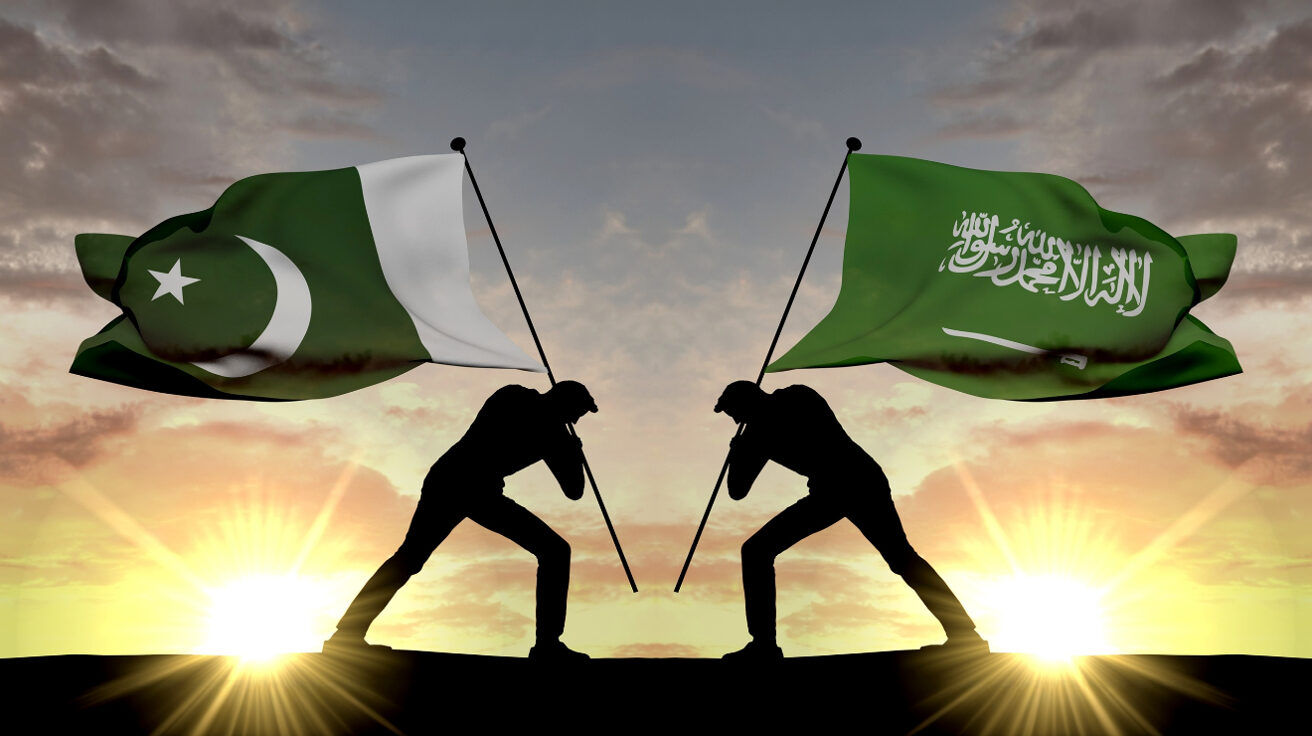Saudi Arabia–Pakistan Mutual Defense Pact: Nuclear Shadows and Waning US Influence Define Riyadh–Islamabad’s Boldest Step Yet
Policy expert Alex Mishra told TML, 'The Saudi Arabia–Pakistan mutual defense agreement is poised to fundamentally redefine US foreign policy'
[Islamabad] Pakistan and Saudi Arabia’s defense partnership, spanning more than half a century, reached a new peak last Wednesday when Prime Minister Shehbaz Sharif and Crown Prince Mohammed bin Salman signed a Strategic Mutual Defense Agreement in Riyadh.
According to Islamabad’s official statement, the agreement “demonstrates the shared commitment of both nations to bolster security in the region. It is intended to expand areas of defense cooperation between the two countries and to strengthen their joint deterrence against any aggression.”
The text further declares that “an attack on either country will be regarded as an attack on both.”
The announcement comes at a critical juncture, as Israel’s recent strikes in Doha have heightened concerns across the Arab world, highlighting the need for stronger defense alignments.
The Israeli strike has not only escalated regional tensions but also reinforced fears that the conflict could spill over into other Arab states.
Against this backdrop, Gulf countries are increasingly taking steps to bolster their security frameworks and forge new alliances to counter emerging threats.
Pakistan’s deputy prime minister and foreign minister, Muhammad Ishaq Dar, speaking to journalists in London on Saturday, hinted that other Gulf states are interested in joining the strategic pact but declined to share further details.
He also stressed the significance of the Pakistan–Saudi defense agreement, noting that it was the outcome of months of effort rather than an overnight development.
For Saudi Arabia, this strategic agreement marks more than just a defense pact; it reflects Riyadh’s determination to recalibrate its security posture by diversifying strategic partnerships.
In defense circles, this agreement is being referred to as “Article Five,” a term used among NATO member states, meaning that an attack on one is considered an attack on all member states.
Though the in-depth details of this are not being made public yet, the move demonstrates a significant shift in the regional security landscape.
On the surface, the agreement seeks to strengthen bilateral security cooperation and joint defense, but its timing—amid rising tensions in the Middle East—has heightened its broader significance.
Saudi–Pakistani defense cooperation began in the 1960s and was formalized in 1967. In the 1970s, it expanded with Pakistani officers serving in Saudi Arabia, thousands of Saudi troops receiving training in Pakistan, and assistance provided for civil aviation and Yemeni border defenses. In more recent years, the partnership has diversified to include joint exercises, defense production, and technology sharing, highlighted in 2017 when former Army Chief Gen. Raheel Sharif took command of the Saudi-led Islamic Military Counter Terrorism Coalition.
Beyond defense cooperation, the kingdom is home to more than 2.5 million Pakistani expatriates—the largest overseas community contributing remittances—and has consistently extended financial support to Islamabad during times of economic crisis.
Following the signing of the Saudi–Pakistan joint defense agreement, a wave of international speculation has emerged, largely because Pakistan remains the only Islamic country with nuclear capability.
The deal is widely seen as carrying implications beyond conventional defense, with some fearing it could pave the way for Pakistan to share nuclear technology with Saudi Arabia.
These concerns gained further traction after Pakistan’s Defense Minister Khawaja Muhammad Asif, in a television interview on Friday, remarked that “Pakistan’s nuclear program would be ‘available’ to Saudi Arabia if needed.”
He added: “What we have, and the capabilities we possess, will be made available [to Saudi Arabia] under this agreement.”
While officials in Islamabad and Riyadh have not explicitly mentioned nuclear cooperation, the timing of Asif’s remarks has added a new layer of complexity to the unfolding narrative surrounding the defense pact.
Give the gift of hope
We practice what we preach:
accurate, fearless journalism. But we can't do it alone.
- On the ground in Gaza, Syria, Israel, Egypt, Pakistan, and more
- Our program trained more than 100 journalists
- Calling out fake news and reporting real facts
- On the ground in Gaza
- Covering Israel, Syria, Lebanon
- More than 100 students
- Exposing fake news
Join us. Support The Media Line. Save democracy.


Zalmay Khalilzad, a seasoned US diplomat and a former US special envoy for Afghanistan, stated on his X account: “A potentially consequential step in Pakistan–Saudi relations has reportedly been announced, a mutual defense agreement (not on the level of a treaty, but it’s not clear if Saudi Arabia and Pakistan make a distinction between a treaty and an agreement) stating that any aggression against one country would be considered aggression against both.”
Khalilzad questioned: “Was this in reaction to Israel attacking a target in Qatar? Or does this confirm long-standing rumors that the Pakistani nuclear weapons program is unofficially ‘co-sponsored’ by the Saudis? Does the agreement have secret annexes, and if so, what do those say?
Pakistan has nuclear weapons and delivery systems that can hit targets across the Middle East, including Israel
He continued, “Is the agreement an indication of declining confidence in US deterrence and defense on the part of Saudi Arabia and perhaps others? Pakistan has nuclear weapons and delivery systems that can hit targets across the Middle East, including Israel. It is also a developing system that can reach targets in the US Many questions… dangerous times.”
However, addressing Khalilzad’s concerns, Foreign Ministry spokesperson Shafqat Ali Khan stated at the weekly press briefing: “We don’t comment on every individual’s opinion. Media is full of various assessments and statements. Khalilzad’s proclivity against Pakistan is well known; this hostility is one of the constants, and I think the only time he is not thinking of Pakistan is when he is sleeping!”
The Media Line spoke with some analysts in the backdrop of this strategic agreement.
Moamer Al-Suleman, a leading Dammam-based researcher and authority on global political affairs, told The Media Line that “Pakistan’s nuclear capabilities, a key pillar of South Asian deterrence, now shape Saudi Arabia’s strategic landscape under the joint defense pact.”
He noted that the pact elevates Saudi–Pakistani ties from traditional military cooperation to a strategic partnership rooted in “shared security,” making their mutual defense commitment a central pillar of regional security.
The defense agreement also indicates Saudi Arabia’s growing perception that the US security umbrella is no longer sufficient or reliable
Al-Suleman emphasized that “the defense agreement also indicates Saudi Arabia’s growing perception that the US security umbrella is no longer sufficient or reliable.”
At the same time, he explained, the implicit “Pakistani nuclear umbrella” provides an added layer of deterrence in the face of Israel, widely regarded in the region as an undeclared nuclear power.
Al-Suleman claimed that “Riyadh’s frustration with Washington’s weak response to Houthi strikes and its support for Israel in Gaza, compounded by the Israeli attack on Doha, convinced Saudi leaders that US security guarantees can no longer be relied upon alone.”
As a result, he stressed, Riyadh has been compelled to recalibrate its security partnerships on more independent and pragmatic terms.
“The agreement is likely to unsettle Washington, signaling Riyadh’s shift from US dependence toward diversified, independent defense partnerships,” Al-Suleman said.
He further pointed out that, as Khalilzad suggested, this agreement could be the beginning of a wider trend. Other regional powers—such as Turkey or Egypt—may also seek alternatives to US security assurances.
Alex Mishra, a master of public policy at Liberty University in the Washington–Baltimore area who focuses on Asian politics, told The Media Line: “The Saudi Arabia–Pakistan mutual defense agreement is poised to fundamentally redefine US foreign policy.”
Mishra noted that “this shift represents more than just a regional alignment—it directly challenges US influence in the Middle East and South Asia at a time when China and Russia are expanding their footholds.”
He underlined that “the pact strengthens Saudi Arabia’s position as it edges closer to potential nuclear capability, while simultaneously cementing Pakistan’s role as the only nuclear-armed Muslim state. Together, they form a strategic bloc that the US cannot afford to ignore.”
“Following the strategic defense pact, the US will be compelled to deepen ties with both Riyadh and Islamabad, as Washington is already recalibrating its relationship with Pakistan while continuing to depend on Saudi Arabia for vital bases and airfields,” he continued.
Mishra stressed that “for the US, the Saudi–Pakistan deal heightens concerns over China’s growing influence, while Afghanistan remains a dual challenge of terrorism and great-power rivalry.”
He added that the “Trump administration’s plans to retake Bagram Air Base and launch a second ‘Abraham Accords’ including Saudi Arabia underscore the need to maintain strong ties with Riyadh and Islamabad.”
Retired Brig. Gen. Muhammad Zeeshan, one of Pakistan’s leading defense and security analysts based in Islamabad, told The Media Line that “the question raised by Khalilzad concerns the nuclear implications of secret military cooperation between Pakistan and Saudi Arabia.”
He explained that “officially, neither country has spoken about nuclear or unconventional strategic capabilities, but it is likely that such cooperation exists.” Zeeshan emphasized that “there are three possible scenarios: technology transfer, Saudi Arabia purchasing nuclear assets, or the alliance being viewed as nuclear-capable if one partner already possesses such weapons.”
Officially, neither country has spoken about nuclear nor unconventional strategic capabilities, but it is likely that such cooperation exists
Zeeshan underlined that the first two options are unlikely, as Pakistan would neither permit nor pursue them. “The most probable scenario is the third,” Zeeshan noted, “which means that in a conflict with a third party, the alliance itself would be regarded as nuclear-capable.”
Zeeshan added that “Riyadh views this partnership as part of preparing for a shifting global order, where power is increasingly multipolar and regional alliances carry greater weight.”
In conclusion, Zeeshan underlined that “Saudi Arabia regards its defense pact with Pakistan as a step toward adapting to this new reality—political for now but with long-term military benefits.”
Umair Aslam, a geostrategic analyst and founder of the Global Defense Insight publication, told The Media Line that “the Pakistan–Saudi Arabia Mutual Defense Agreement is purely conventional, covering deterrence, training, interoperability, logistics, maritime security, air defense, counterterrorism, intelligence sharing, and defense industry cooperation, with no role for nuclear sharing or technology transfer.”
He emphasized that “Pakistan’s nuclear program is strictly national and not intended for any form of ‘umbrella’ role.”
Aslam explained that “the agreement also opens avenues for limited defense co-production, maintenance, and technology cooperation within nonproliferation rules, while institutionalizing crisis coordination through structured consultation and joint planning mechanisms.”
He noted that the “pact is defensive in nature, reinforcing Pakistan’s commitment to credible minimum deterrence, regional stability, and nonproliferation norms, while strengthening crisis-management channels and joint readiness to prevent miscalculation.”
Aslam stressed that “Riyadh and Islamabad are exercising sovereign choices to diversify defensive cooperation.”
Finally, he underlined that “the agreement will recalibrate Pakistan–Saudi defense relations by anchoring them in a mutual defense commitment that establishes clear declaratory deterrence—an attack on one will be treated as an attack on both.”

